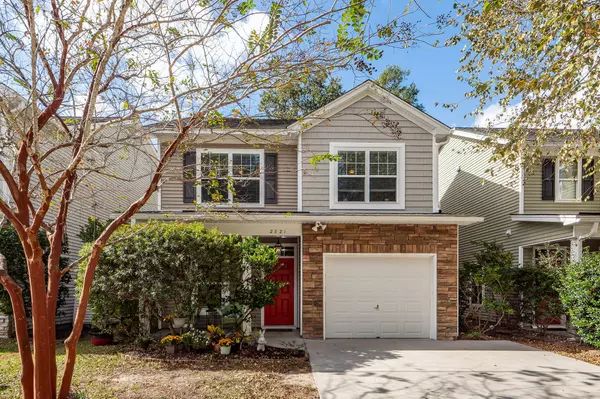What Does Contingent Mean on a Home For Sale

In this post, we'll define what contingent means on a home for sale, show a few examples of how contingencies on homes are used, and provide advice for submitting an offer on a contingent home.
What does contingent mean?
Merriam-Webster defines "Contingent" as: "Dependent on or conditioned by something else." which is accurate, but it also defines it as, "likely but not certain to happen." which is also true - especially in real estate.
A home listed as contingent means an offer has been made and accepted, but for the deal to move forward, certain conditions must be met. These contingencies are written into the purchase agreement or sales contract. If one or more of the conditions aren't met within a certain timeframe, the sale of the home could be in jeopardy.
These contingencies aren't uncommon and typically fall within a few categories which we'll go over in the next section.
 photo by Tierra Mallorca
photo by Tierra Mallorca
What are some common contingencies?
Home Inspection Contingency
The home inspection contingency is put in place to ensure that the home is in acceptable condition. During the inspection, the home inspector assesses the home for all the aspects of the home from leaky faucets to cracks in the foundation.
If the inspection uncovers serious issues with the home, the buyer and seller will either negotiate who pays to address the issues, ask for financial credits or the buyer may back out of the deal. It's not advisable to waive this contingency as it could result in significant expenses for the buyer later on.
However, if you do decide to waive this, having a professional inspection anyway is a good idea.
Financing Contingency
A financing contingency, also known as a mortgage contingency is put in place mainly to protect the buyer in the event they're unable to secure financing within a certain timeframe. Of course, if you've read any of my blog posts about mortgage loans, you'll know that you should get pre-approval before beginning your home search. Not only does it put you that much closer to securing your mortgage, but it sets your budget and makes any offer you submit stronger.
However, things can still happen after you've been pre-approved that could cause changes in your loan eligibility. Many a transaction has screeched to a halt after it's discovered that buyers have taken out a loan, purchased new furniture for the home on credit, or changed jobs - all of which change the buyer's financial situation in the eyes of the mortgage lender.
This contingency allows the buyer the option of time to secure different financing or walk away from the deal without losing their deposit if they're unable to secure a mortgage.
In a competitive real estate market, it may be tempting to waive this contingency to get the upper hand in a bidding war. But doing so means if the buyer is denied the loan, they can lose their deposit.
Appraisal Contingency
A home buyer's mortgage lender will always require a home appraisal as part of the loan approval process. While the seller may be asking for a specific amount for their home, and it seems reasonable based on the market and the values of other homes in the area, the lender is only going to loan an amount that the home appraises for.
So, while making sure the home appraises as high as possible is another story altogether, the buyer can protect themselves from this issue with an appraisal contingency.
With an appraisal contingency, the buyer has the option to negotiate for a lower price on the home or opt out of the contract altogether if the appraisal comes in lower than the agreed-upon purchase price. But it also gives you time, to negotiate.
As the home seller, you may ask the buyer to make up the difference in cash, offer to meet them in the middle on the difference, or challenge the appraisal if you believe it used inaccurate info.
In seller's markets, it can be tempting to waive an appraisal contingency to make your home offer more attractive to the seller. But, you could certainly find yourself paying more than the home is currently worth setting you up for the need to stay in your home long enough to build up your equity or take a loss if you sell the home again within a few years.
Just remember that the lender will only offer a certain amount based on the appraised value, and you'll be on the hook for the rest.
Title Contingency
It's pretty much standard in every real estate transaction that the home in question comes with a clean title. A clean title means that the seller owns the home free and clear and there are no liens or other encumbrances on the home bringing the true owner of the home into question.
Confirming this involves performing a title search which is done by a title company whose job is to make sure the seller is the only one with a legal claim to the home.
Title contingencies protect the buyer should any issues with the title be revealed. If any liens or other issues are discovered, the seller is required to resolve those issues before the sale of the home can be completed or the buyer can walk away from the deal.
 photo by Thirdman
photo by Thirdman
Home Sale Contingency
This states that the purchase of a home is contingent on the buyer being able to sell their home first.
It's also quite common for the seller to reject this contingency, especially in a seller's market because there's most likely a list of backup offers that may be able to close quickly without this contingency in place or will to waive it altogether.
One way home buyers can avoid the need for this is to use a lender that can provide a bridge loan or other methods of securing the funds to avoid the contingency, but these alternative methods could be very risky and I don’t recommend them.
Buyers can also request a later closing date than typical allowing you more time to sell your home. Most of the time, however, this will be rejected as well UNLESS the seller is also trying to find a home or they're not in a rush to move in the case of a family who wants to wait until the end of the school year.
In most situations, though a home sale contingency never favors the seller so it will be difficult to keep this in place. If a seller accepts this, they lose most of the control in the transaction relying on the buyer to make good decisions on the listing and pricing of their home to sell it quickly. Being in that sort of limbo will turn most sellers off of the deal.
Types of contingent statuses
Contingent with Kick-Out
One way for the seller to maintain control of the sale of their home with a home sale contingency is to include what's called a "Kick-Out" clause in their agreement. "Contingent with Kick-Out" means that the seller will accept the buyer's offer with a home sale contingency but will continue to accept backup offers.
If the seller receives a better offer without a home sale contingency, the seller can "Kick Out" the current buyer from their purchase agreement if they're unable or unwilling to waive their home sale contingency or make a better counter offer.
Homebuyers need to remember that the seller can't simply cancel their current agreement with you using this tactic. They're required to inform you of a better offer and allow you the opportunity (usually a 48-hour window) to meet or beat it.
Contingent with No Kick-Out
The most common contingent status is "Contingent with No Kick-Out" which prevents sellers from accepting other offers while the current contingencies are negotiated.
Even if the seller is frustrated with the negotiation process and wants to move on, they can't until all efforts to compromise are exhausted.
Contingent Continue to Show
If your real estate agent sees a listing that's designated, "Contingent-Continue to Show", this means the seller has an accepted offer but the buyer has included multiple contingencies in the purchase contract that need to be addressed. And while that happens, the seller is allowing the home to continue being shown and hoping to receive backup offers.
While for the current buyer, you could certainly take this as a sign that your offer is on shaky ground - for other potential buyers, it means it could be worth submitting an offer. That is of course if your offer contains fewer contingencies than the current offer.
Contingent No Show
Once they've accepted an offer, most sellers don't want the hassle of continuing to show their home while under contract. "Contingent - No Show" is a pretty good sign the home is as good as sold and it would be unlikely that trying to submit an offer would be productive.
Short Sale Contingent
The term, "Short Sale" is a bit of a sneaky term because short sales are never very short... But, to be clear, a short sale occurs when the lender is willing to accept less than what's still owed on the mortgage for the home.
"Short Sale Contingent" means an offer has been accepted but the seller and their agent are continuing to accept backup offers in case the current one happens to fall through. And unless the current buyer can't meet their contingencies, the sale will likely go through. So, while you could certainly submit an offer, there's no guarantee it will be accepted and you'll likely end up waiting a substantial amount of time to find out either way.
Can you still make an offer on a contingent house?
The short answer to this is, yes, you can still make an offer on a contingent home. No matter what contingent status the home is in, your offer would become a backup offer and would be subject to the outcome of the current buyer/seller agreement.
 photo by Scott Graham
photo by Scott Graham
Tip for submitting an offer on a contingent listing
Usually, you'll have a much higher chance of success submitting an initial offer on a home listed as "Active", meaning there are currently no accepted offers and all offers are being considered.
However, if FOMO or "Fear of Missing Out" is hot on your tail and you'd rather say you gave it your best shot than none at all, here's my suggestion for submitting an offer.
First and foremost, you must be working with an experienced real estate agent or Realtor®, not only will they be able to provide their guidance on submitting a backup offer. But, they may have a good working relationship with the seller's agent who can provide them with important information about the current offer to consider when putting together yours.
What's the difference between contingent and pending?
As I mentioned at the beginning of the post, "Contingent" means the property is under contract but the purchase agreement contains contingencies that need to be met before moving forward before finalizing the sale.
"Pending" means all contingencies have been removed or there were never any in the initial offer and the buyer and seller are moving forward to closing. A pending listing is also no longer considered an active listing and offers are no longer being accepted.
How often do contingent offers fall through?
While I can't give a percentage, many contingencies may not be met. Home inspection and financing contingencies are the biggest issues I typically see in real estate transactions.
 photo by Scott Graham
photo by Scott Graham
The Bottom Line
Whether you find yourself in a buyer's market or a seller's market, contingencies will always play a factor in the sale of a home. Understanding what each means is important for the buyer and the seller to make informed decisions during their roles in the real estate transaction.
For the buyer, contingencies are there to protect your best interests and to help you. They can also hinder your chances if you're inflexible.
For the seller, contingencies can delay the process and potentially cause stress. However, they may be a necessary evil to make the sale happen.
Either way, your real estate agent should be able to advise you on the best steps to take to ensure the process is as smooth and stress-free as possible.
If you're thinking about buying, download my free Dream Home Handbook to help with your home search!
 Ashley Melton, Realtor® | 843-670-2333 | Ashley.Melton@AgentOwned.com
Ashley Melton, Realtor® | 843-670-2333 | Ashley.Melton@AgentOwned.com
Categories
- All Blogs (55)
- Charleston, South Carolina (13)
- First-Time Home Buyers (13)
- Folly Beach, South Carolina (12)
- Goose Creek South Carolina (1)
- Home Appraisals (2)
- Home Buying (34)
- Home Inspections (2)
- Home Maintenance (3)
- Home Selling (14)
- James Island, South Carolina (3)
- Mount Pleasant, South Carolina (3)
- New Home Construction (1)
- Summerville, South Carolina (1)
- West Ashley, South Carolina (3)
Recent Posts











